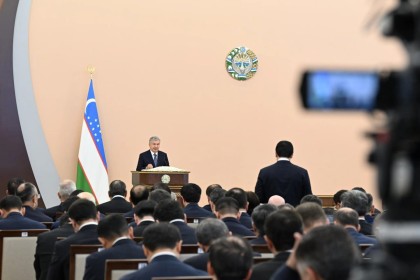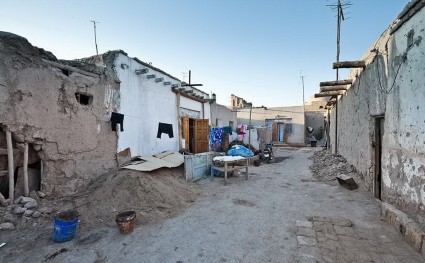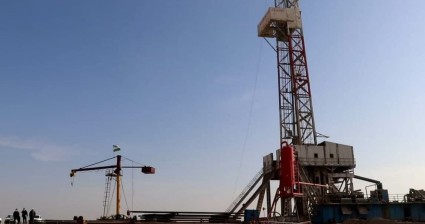After 17 long years of growing cotton and vegetables on his farm in Uzbekistan, Abbas has decided to give up farming, a story of Radio Free Europe says.
He says President Shavkat Mirziyoev's latest decree for Uzbekistan's tightly controlled agricultural sector will force him to become a subservient contract employee of a new private "cluster" firm.
"I prefer to be unemployed," said Abbas, who didn't want his last name used for fear of retribution.
"The terms of the cluster-firm contracts are not acceptable to me," he told RFE/RL. "It means we have no independence whatsoever. I won't be working the land for myself anymore."
Abbas says his income would also be greatly reduced under a contract that is designed to maximize the profits of the cluster firm by exploiting farmers.
Hidden Privatization Scheme
Indeed, Uzbekistan's cluster system is essentially a new form of "hidden" or "secret privatization" -- a scheme used by officials and their private-sector cronies in Eastern Europe during the 1990s to plunder the assets of state firms.
In Uzbekistan's case, the new private "clusters" are assuming the state's long-time monopoly control over the most profitable aspects of agriculture without adequately compensating farmers for their role.
The World Bank has pumped more than $637 million into Uzbekistanthrough its Horticulture Development Project since 2014 -- including $500 million in World Bank loans approved in January 2018 when Tashkent launched the so-called "cluster" reform plan.
Hideki Mori, the World Bank's country manager for Uzbekistan, says those funds are meant to help create "better paid jobs in rural areas" where about half of the country's 32 million people live.
Mori says the international financing also should help Uzbekistan bolster "food security and exports" through "transitional reforms" that move the country "from a state-driven development model to a private-sector-led economy."
But Abbas says the reforms are merely enriching the shadowy owners of the new private cluster firms. All farmland remains state-owned.
Farmers like Abbas who do the heavy field work say they are getting even less compensation and still must take on the risk of losses from failed harvests.
Neither farmers nor local officials are certain about the identities of the owners of many clusters. But there are reports of links between some senior officials in Tashkent and the lucrative clusters.
Links To Senior Officials?
The private agriculture monopolies are being set up by the government in Tashkent without competitive public tenders or transparency.
And one former district mayors told that he'd been pressured by senior officials in the Interior Ministry and presidential administration to distribute contracts for the most productive farmland to specific clusters.
There are also unconfirmed allegations that some cluster owners have links to senior officials in Tashkent -- including relatives of Mirziyoev in his native province of Jizzakh.
Mirziyoev announced on December 9 that he is expanding Uzbekistan's two-year-old cotton cluster system to include fruit and vegetable farms.
Justifying the move, Mirziyoev credited the private cluster firms for boosting the productivity of Uzbekistan's strategic cotton sector by 30 percent in 2019.
He also noted that after just two years, private cluster firms now account for 73 percent of Uzbekistan's cotton harvest.
But international experts warn that any initial gains from so-called "cluster reforms" are likely to fizzle out in the long run unless more competition is introduced.
For now, the state has marked out monopoly territory where each private cluster firm operates -- reducing incentives for farmers like Abbas who have no choice over which cluster they work through.
"Without competition between clusters, it's already failure by design," says Nodir Djanibekov, a researcher at the Leibniz Institute of Agricultural Development in Transition Economies in Hannover, Germany.
"If the clusters don't compete for each farmer, and if the farmers don't have a choice about which marketing channel they use, you still have a monopoly," Djanibekov tells RFE/RL. "Instead of a state monopoly, it becomes a private monopoly."
"In this situation, the private clusters will only offer farmers the minimum price that is guaranteed by the state for their crops," says Djanibekov, whose work has been cited in policy papers on Uzbekistan published by the World Bank.
"The way to ensure farmers produce more is to pay them a better price," he says. "If the farmers don't see any incentives, production will just start collapsing."
A similar scenario occurred with Tajikistan's cotton farmers in 2000 and has been unfolding more recently in Kazakhstan, Djanibekov warns.
Djanibekov notes that the interests of ordinary farmers "are not very well represented" in the government's decrees about agriculture clusters.
"They are mostly talking about investors and all the subsidies the investors receive -- programs for clusters to buy machinery at cheaper prices, subsidizing credit for them from the state, agriculture input programs for clusters to participate in via the input commodity exchange."
"There is not much about protecting farmers in the decrees except the guaranteed minimum price" for their crops, Djanibekov says.












